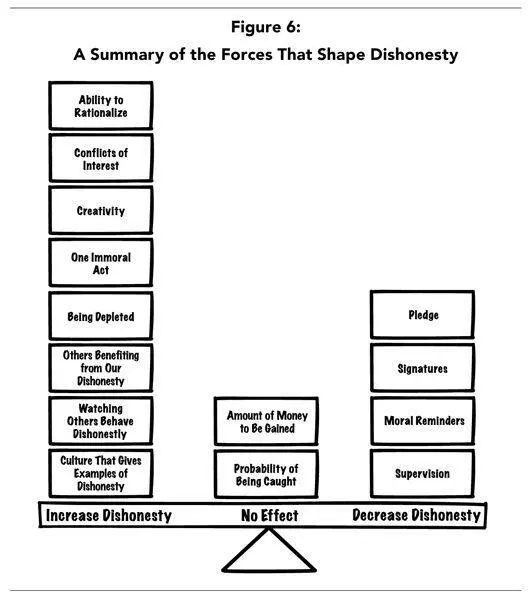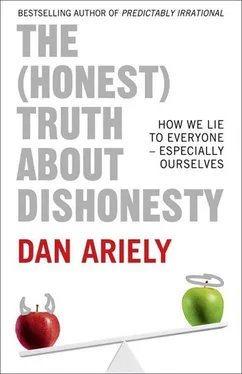Ariely, Dan - The (Honest) Truth About Dishonesty - How We Lie to Everyone – Especially Ourselves
Здесь есть возможность читать онлайн «Ariely, Dan - The (Honest) Truth About Dishonesty - How We Lie to Everyone – Especially Ourselves» весь текст электронной книги совершенно бесплатно (целиком полную версию без сокращений). В некоторых случаях можно слушать аудио, скачать через торрент в формате fb2 и присутствует краткое содержание. Жанр: Старинная литература, на английском языке. Описание произведения, (предисловие) а так же отзывы посетителей доступны на портале библиотеки ЛибКат.
- Название:The (Honest) Truth About Dishonesty: How We Lie to Everyone – Especially Ourselves
- Автор:
- Жанр:
- Год:неизвестен
- ISBN:нет данных
- Рейтинг книги:4 / 5. Голосов: 1
-
Избранное:Добавить в избранное
- Отзывы:
-
Ваша оценка:
- 80
- 1
- 2
- 3
- 4
- 5
The (Honest) Truth About Dishonesty: How We Lie to Everyone – Especially Ourselves: краткое содержание, описание и аннотация
Предлагаем к чтению аннотацию, описание, краткое содержание или предисловие (зависит от того, что написал сам автор книги «The (Honest) Truth About Dishonesty: How We Lie to Everyone – Especially Ourselves»). Если вы не нашли необходимую информацию о книге — напишите в комментариях, мы постараемся отыскать её.
The (Honest) Truth About Dishonesty: How We Lie to Everyone – Especially Ourselves — читать онлайн бесплатно полную книгу (весь текст) целиком
Ниже представлен текст книги, разбитый по страницам. Система сохранения места последней прочитанной страницы, позволяет с удобством читать онлайн бесплатно книгу «The (Honest) Truth About Dishonesty: How We Lie to Everyone – Especially Ourselves», без необходимости каждый раз заново искать на чём Вы остановились. Поставьте закладку, и сможете в любой момент перейти на страницу, на которой закончили чтение.
Интервал:
Закладка:
CHEATING AND INFIDELITY
Of course, no book about cheating would be complete if it didn’t contain something about adultery and the kinds of complex and intricate subterfuges that extramarital relationships inspire. After all, in the popular vernacular, cheating is practically synonymous with infidelity.
In fact, infidelity can be considered one of the main sources of the world’s most dramatic entertainment. If modern-day adulterers such as Liz Taylor, Prince Charles, Tiger Woods, Eliot Spitzer, Arnold Schwarzenegger, and many others hadn’t cheated on their spouses, the tabloid magazine and various entertainment news outlets would probably go belly-up (so to speak).
In terms of the fudge factor theory, infidelity is most likely the prototypical illustration of all the characteristics of dishonesty that we have been talking about. To start with, it is the poster child (or at least one of them) of a behavior that does not stem from a cost-benefit analysis. I also suspect that the tendency toward infidelity depends to a great extent on being able to justify it to ourselves. Starting with one small action (maybe a kiss) is another force that can lead to deeper kinds of involvement over time. Being away from the usual day-to-day routine, for example on a tour or a set, where the social rules are not as clear, can further enhance the ability to self-justify infidelity. And creative people, such as actors, artists, and politicians—all known for a tendency to be unfaithful—are likely to be more adept at spinning stories about why it’s all right or even desirable for them to behave that way. And similar to other types of dishonesty, infidelity is influenced by the actions of those around us. Someone who has a lot of friends and family who have had affairs will likely be influenced by that exposure.
With all of this complexity, nuance, and social importance, you might wonder why there isn’t a chapter in this book about infidelity and why this rather fascinating topic is relegated to one small section. The problem is data. I generally like to stick to conclusions I can draw from experiments and data. Conducting experiments on infidelity would be nearly impossible, and the data by their very nature are difficult to estimate. This means that for now we are left to speculate—and only speculate—about infidelity.

What Should We Do Next?
So here we are, surrounded by dishonesty. As one Apoth E. Cary put it in 1873:
Swindle, swindle, everywhere,
Every shape and size;
Take the swindle out of a man,
And you’ve nothing left but lies.
Philanthropy is made to cover a fraud,
Charity keeps humbugs in tow;
And we’re swindled at home, swindled abroad,
And swindled wherever we go.
For the world is full of humbugs
Managed by dishonest men;
One moves on, another comes,
And we’re swindled again and again.
—APOTH E. CARY, “RECOLLECTIONS OF THE SWINDLE FAMILY” 1
As we have seen, we are all capable of cheating, and we are very adept at telling ourselves stories about why, in doing so, we are not dishonest or immoral. Even worse, we are prone to “catch” the cheating bug from other people, and once we start acting dishonestly, we are likely to continue misbehaving that way.
So what should we do about dishonesty? We recently experienced a tremendous financial crisis, which has provided an excellent opportunity to examine human failure and the role that irrationality plays in our lives and in society at large. In response to this man-made disaster, we’ve taken some steps toward coming to terms with some of our irrational tendencies, and we’ve begun reevaluating our approach to markets accordingly. The temple of rationality has been shaken, and with our improved understanding of irrationality we should be able to rethink and reinvent new kinds of structures that will ultimately help us avoid such crises in the future. If we don’t do this, it will have been a wasted crisis.
MEMENTO MORI
There are a lot of possible connections one can draw between Roman times and modern-day banking, but perhaps the most important of them is memento mori . At the peak of Rome’s power, Roman generals who had won significant victories marched through the middle of the city displaying their spoils. The marching generals wore purple-and-gold ceremonial robes, a crown of laurels, and red paint on their face as they were carried through the city on a throne. They were hailed, celebrated, and admired. But there was one more element to the ceremony: throughout the day a slave walked next to the general, and in order to prevent the victorious general from falling into hubris, the slave whispered repeatedly into his ear, “Memento mori,” which means “Remember your mortality.”
If I were in charge of developing a modern version of the phrase, I would probably pick “Remember your fallibility” or maybe “Remember your irrationality.” Whatever the phrase is, recognizing our shortcomings is a crucial first step on the path to making better decisions, creating better societies, and fixing our institutions.
THAT SAID, OURnext task is to try to figure out more effective and practical ways to combat dishonesty. Business schools include ethics classes in their curricula, companies make employees sit through seminars on the code of conduct, and governments have disclosure policies. Any casual observer of the state of dishonesty in the world will quickly realize that such measures don’t get the job done. And the research presented here suggests that such Band-Aid approaches are doomed to fail for the very simple reason that they don’t take into account the psychology of dishonesty. After all, every time policies or procedures are created to prevent cheating, they target a certain set of behaviors and motivations that need to change. And generally when interventions are set forth, they assume that the SMORC is at play. But as we have seen, this simple model has little to do with the driving forces behind cheating.
If we are really interested in curbing cheating, what interventions should we try? I hope it is clear by now that if we are to stand a chance of curbing dishonesty, we must start with an understanding of why people behave dishonestly in the first place. With this as a starting point, we can come up with more effective remedies. For example, based on our knowledge that people in general want to be honest but are also tempted to benefit from dishonesty, we could recommend reminders at the moment of temptation, which, as we’ve seen, are surprisingly effective. Similarly, understanding how conflicts of interest work and how deeply they influence us makes it clear that we need to avoid and regulate conflicts of interest to a much higher degree. We also need to understand the effects that the environment, as well as mental and physical depletion, plays in dishonesty. And of course, once we understand the social infectiousness of dishonesty, we could take a cue from the Broken Windows Theory to combat the social contagion of cheating.
INTERESTINGLY, WE ALREADYhave many social mechanisms in place that seem to be designed specifically for resetting our moral compass and overcoming the “what-the-hell” effect. Such resetting rituals—ranging from the Catholic confession to Yom Kippur, and Ramadan to the weekly Sabbath—all present us with opportunities to collect ourselves, stop the deterioration, and turn a new page. (For the nonreligious, think of New Year’s resolutions, birthdays, changes of job, and romantic breakups as “resetting” opportunities.) We have recently started carrying out basic experiments on the effectiveness of these types of resetting approaches (using a nonreligious version of the Catholic confession), and so far it seems that they can rather successfully reverse the what-the-hell effect.
Читать дальшеИнтервал:
Закладка:
Похожие книги на «The (Honest) Truth About Dishonesty: How We Lie to Everyone – Especially Ourselves»
Представляем Вашему вниманию похожие книги на «The (Honest) Truth About Dishonesty: How We Lie to Everyone – Especially Ourselves» списком для выбора. Мы отобрали схожую по названию и смыслу литературу в надежде предоставить читателям больше вариантов отыскать новые, интересные, ещё непрочитанные произведения.
Обсуждение, отзывы о книге «The (Honest) Truth About Dishonesty: How We Lie to Everyone – Especially Ourselves» и просто собственные мнения читателей. Оставьте ваши комментарии, напишите, что Вы думаете о произведении, его смысле или главных героях. Укажите что конкретно понравилось, а что нет, и почему Вы так считаете.












